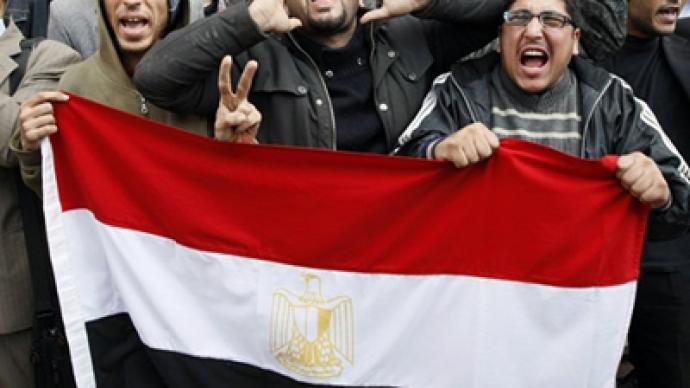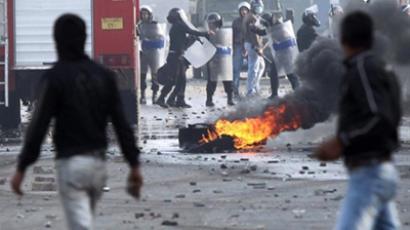Mubarak hopes to thwart "mega protest" with new government

Egyptian President Hosni Mubarak, in an effort to defuse a precarious political standoff that has entered its seventh day, has sworn in a new government.
The newly announced Cabinet includes some familiar faces of Mubarak's regime, but the businessmen who supervised the country's painful economic liberalization policies in recent decades were fired. Retired police general, Mahmoud Wagdi, was named to replace Habib el-Adly, the interior minister who heads internal security forces. Adly was reportedly reviled by protesters for the brutality shown by security forces.The longest-serving cabinet minister, Culture Minister Farouq Hosni, was replaced by Gaber Asfour, a prominent literary figure respected by the Egyptian public.Zahi Hawass, a well-known archaeologist, was appointed to the post of state minister for antiquities, a newly created government office.Meanwhile, Muhid Shehab, State Minister for Legal and Parliamentary Affairs, kept his post and swore a new oath of office.The transition to a new government, however, may be too late, too little as the opposition seems determined to force Mubarak out of office.On Sunday evening, Mohamed ElBaradei, 67, the leader of “National Association of Change,” defied a late-night curfew as he appeared in Cairo's Tahrir Square and called for the Mubarak "regime" to relinquish its grip on power."We have an essential demand, the departure of this regime and we will start a new phase, a new Egypt where every Egyptian will live in freedom and dignity," ElBaradei told a crowd of an estimated 5,000.The balding and bespectacled Mohamed ElBaradei, a Nobel Peace Prize winner and former Director General of the International Atomic Energy Agency, has become a rather unlikely rallying figure for protesters, who say they are fighting for "economic and social justice."Unlike earlier conflicts between protesters and police, the Egyptian security forces made no attempt to disperse the crowd.The demonstrations, which aim to oust Mubarak, who has ruled the Arab Republic since 1981, have found enough combustible material in the plight of average Egyptians, whose standard of living ranks as one of the lowest in the Arab world.According to local media reports, at least 100 people across the country have been killed in the anti-government protests, while an estimated 1,100 people are recovering from their injuries in hospitals in Cairo. Will a new government save Mubarak?Amidst a rapidly deteriorating situation, which got a major boost on Friday when the Muslim Brotherhood called on its followers to take to the streets, opposition leaders are calling for another massive demonstration on Tuesday in an effort to loosen Mubarak's 30-year grip on power. According to AlJazeera, the so-called April 6 Movement said it anticipates to have more than one million people on the streets of Cairo, the Egyptian capital, as the dramatic events seem to be entering a deciding phase.Activist groups responsible for organizing the protests have also been encouraged by events in Tunisia earlier this month when the so-called Jasmine Revolution forced President Zine al-Abidine Ben Ali to flee into exile. As of Monday morning, Egyptian security forces had reduced their presence, possibly in the hope that the announcement of a new government would serve to calm the situation. Mubarak has vowed to stay on as president, hoping that his government reshuffling will appease the Egyptian street. In a nationally televised speech on Saturday, Mubarak pledged to address the economic and political concerns of protesters. "I will not go easy in taking any decisions and will preserve for all Egyptians their security and aspirations," he continued. "And I will defend the security of Egypt and the aspirations of its people, for this is the responsibility and the oath which I had sworn before God and the nation."Mubarak described the street demonstrations as “chaos.” Egypt's Internet services remained cut off Monday morning, while mobile phone services were reportedly working. Meanwhile, hundreds of foreigners, many of them tourists, arrived at Cairo's international airport on Monday, attempting to leave the country. Egyptian air officials, however, say it will take take several days to handle the amount of people who wish to leave the country.Russian Embassy advises cautionEgyptian media is reporting "calm" conditions at the nation's popular tourist destinations, including at Hurghada and Sharm el-Sheikh on the Red Sea. Indeed, Russian tour operators say they still have clients interested in traveling to Egypt, but due to the cut in Internet service cannot make the necessary reservations."All system of booking hotels and plane tickets is based on the Internet, that is why tourists cannot get full information on flights," a female source at a Moscow travel agency told Itar-Tass.Egypt is a popular vacation destination for Russian tourists, especially in the winter when many people are looking for some relief from the weather. "The citizens of Russia staying in Egypt have been advised not to leave homes, apartments, and hotels," Utoyev said. The Russian embassy said it has not received reports about Russians hurt in the riots in Egypt.Meanwhile, Egyptian troops have been posted near the Russian embassy to Egypt located on Giza Street in Cairo."The Russian embassy is being guarded by soldiers. Armored vehicles and military patrols have been deployed near the diplomatic representation," Shamil Utoyev, the head of the Russian embassy's consulate department, told Interfax on Saturday.Will Egypt become radicalized?The anti-government protests hitting Egypt go deeper than just economic considerations, especially for long-term allies of the Arab Republic, like the United States.If recently-released US diplomatic cables by WikiLeaks, the document-dumping website, are a reliable source of information, Washington is content with the Mubarak government for two reasons: it has been helpful in promoting a peace settlement between Israel and the Palestinian Authority, while serving as an ideological buffer against Iran and its call for Islamist fundamentalism.Before Mubarak arrived in Washington in May 2009, Ambassador Margaret Scobey wrote from Cairo that "the Egyptians want the visit to demonstrate that Egypt remains America's indispensable Arab ally."Another leaked Scobey cable, this one from 2009, discusses Washington’s concern with improving human rights. "Mubarak takes this issue personally,” Scobey allegedly wrote. “And it makes him seethe when we raise it, particularly in public."The problem with quoting WikiLeaks diplomatic cables, however, not to mention confusing WikiLeaks with true journalism, is that it basically amounts to following a news script that has been written by somebody else years ago. After all, how can we know for sure what came first: the cable or the leak? Were Scobey’s glowing words of praise, for example, written in the half-knowledge that they would someday be released for public review by an internet upstart called WikiLeaks? Even if that were not the case, the better journalistic approach, it seems, is to forget what was penned in the past and focus on the here and now. One thing that we do know is that the recent wave of revolutions has received a glowing response from Tehran.A government collapse in Tunisia and massive protests in Egypt and Yemen are evidence that Iran's revolution is being replayed, a senior Iranian cleric said Friday.The Iranian Revolution of 1979 was the name of a populist uprising that deposed of the US-backed government of Shah Mohammad Reza Pahlavi and replaced with the Islamic Republic under Ayatollah Khomeini."An Islamic Middle East is taking shape," Ayatollah Ahmad Khatami said in his Friday prayer sermon. "A new Middle East is emerging based on Islam … based on religious democracy."Although it is too early to say whether the ongoing protests will eventually solidify into some sort of radical Islamic reawakening in these secular-based countries, that is exactly the sort of scenario that regional powers, including Israel and the United States, do not want to see happen. An Islamist insurgency cannot be blamed yet for masterminding the disturbances in Egypt, Mikhail Margelov, head of the Federation Council Committee on International Affairs, told Interfax."Now is the time for monitoring, because hasty conclusions could lead to errors which might prove fatal for the leader of the Arab world," Margelov said.However, some sort of "participation" of the poor, mainly looters, points to the fact that representatives of the Muslim Brotherhood, a clandestine organization, are prepared to fight against the corrupt, albeit secular and largely pro-Western regime," he said.Meanwhile, Washington, which purports to be the beacon on the hill when it comes to human rights, has been largely silent on the question of human rights and economic hardship in Egypt, Tunisia and Yemen.U.S. President Barack Obama now appears more hesitant in his support for Mubarak."As the situation continues to unfold, our first concern is preventing injury or loss of life, so I want to be very clear in calling upon the Egyptian authorities to refrain from any violence against peaceful protesters," he said."The people of Egypt have rights that are universal. That includes the right to peaceful assembly and association, the right to free speech and the ability to determine their own destiny. These are human rights and the United States will stand up for them everywhere," Obama added.Robert Bridge, RT














